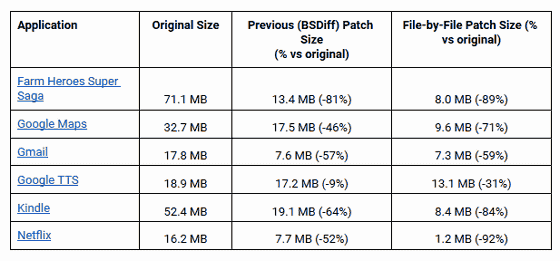Google succeeded in reducing application update size by 65% with new algorithm adoption

It is common for mobile applications to be updated frequently, due to additional features and bug fixes. However, this additional update occasionally enlarges the data size of the application, and it has a big problem that it tightens the storage capacity of the terminal used by the user. Meanwhile, Google has announced that it succeeded in reducing the capacity of update data of Android application by 65%.
Saving Data: Reducing the size of App Updates by 65% | Android Developers Blog
https://android-developers.googleblog.com/2016/12/saving-data-reducing-the-size-of-app-updates-by-65-percent.html
Google recognized that the growing app capacity is a big problem in using mobile terminals such as smartphones and has compromised the user experience. So in July 2016 Google announced that it succeeded in reducing the data size at the time of update by 47% on average by changing the algorithm of the binary difference used when updating the Android application to "BSDiff" It was.
Improvements for smaller app downloads on Google Play | Android Developers Blog
https://android-developers.googleblog.com/2016/07/improvements-for-smaller-app-downloads.html
Furthermore, when we tackled the "data diet" of the application and introduced a new method called "File-by-File patching", we reduced the data size by an average of 65% compared with downloading full-size applications It was said that it succeeded in particular. In addition, it seems that in some cases it has succeeded in reducing the size by as much as 90%.
This is a list of data reduction rates by application. Some applications do not have large difference in data reduction like Gmail, others have dramatic effects like Netflix, and the effect seems different for each application.

In addition, Google says that the file-by-file patching method using BSDiff which succeeded in shrinking the data size considerably has the disadvantage that the CPU power of the terminal is required at the time of updating. If it is a terminal after 2015, the time required for the compression work is several seconds per MB, but for the terminal with poor old performance it will take time to update. However, at the time of writing the article, since the file-by-file patching method requiring an update time is used only for the terminal whose "automatic update is ON", the timing "during charging at midnight not using smartphone" We are updating in the background only with, etc, and Google says it will not be a problem in actual use.
By the way, Thanks to the File-by-File patching method, Google has succeeded in reducing 6 petabytes (6000 TB) of data per day. The source code on the File-by-File Patching method that brought the storage saving effect to users as well as users is published on the GitHub page below.
GitHub - andrewhayden / archive-patcher: Automatically exported from code.google.com/p/archive-patcher
https://github.com/andrewhayden/archive-patcher
Related Posts:







